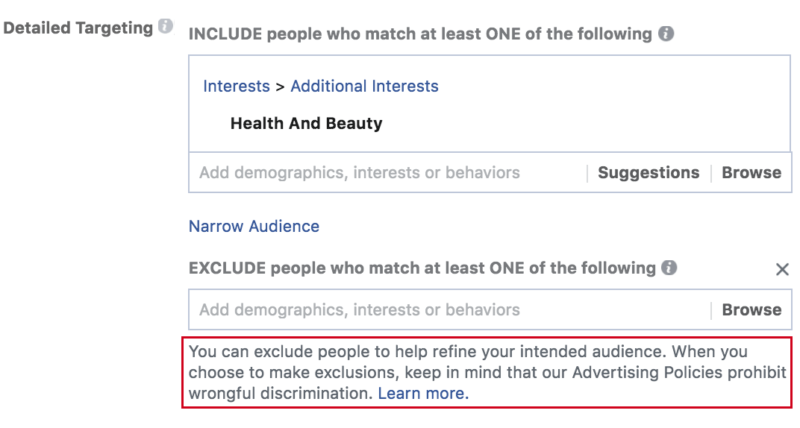Facebook continues to refine its app data & ad-targeting safety measures
The site announced a number of changes to its app APIs and introduced a new ad-targeting prompt that reminds advertisers about anti-discrimination policies.
Facebook continues to shore up its user safety measures on a number of fronts. Yesterday, the site announced several changes to its API platform and released a new statement on all the ways it makes ad targeting more “safe and civil.”
According to a post on the Facebook Business blog, the site has been working with experts in privacy, data ethics and civil rights, along with charitable and advocacy organizations, to keep advertisers from misusing Facebook’s ad targeting capabilities, specifically the ability to discriminate by using exclusion targeting.
Last December, Facebook halted ad targeting that made it possible to exclude racial groups after ProPublica revealed the site’s ad-targeting options could be used to discriminate against ethnic groups.
Ad targeting updates
Now, when Facebook identifies an advertiser running a housing, employment or credit-related ad campaign, the advertiser must certify that they are complying with the site’s anti-discrimination policies and with anti-discrimination law. Facebook says that its systems reject thousands of ads per day for violating these rules and that it has also removed thousands of categories from its exclusion targeting options.
“We focused mainly on topics that relate to potentially sensitive personal attributes, such as race, ethnicity, sexual orientation and religion,” says Facebook.
It has also introduced a new prompt when an advertiser begins to build out an ad campaign that reminds them of the site’s anti-discrimination policies. Here’s a screen shot of what an advertiser will see when choosing the ad platform’s exclusion targeting option:
Facebook API changes
In addition to its statement regarding ad-targeting options, the site announced several changes that impact a number of its APIs, including ones for Facebook Analytics, Instagram Graph, Live and Pages. Many of the changes are scheduled to take place August 1, but some took effect immediately, like the following deprecation for the Instagram Graph:
Effective today, name and biography from comments on your own media will be removed; you will continue to receive username and comment text.
Starting August 1, the Live API — which lets an app publish Live videos on behalf of its users — will only be available to approved partners. Facebook says a new permission model that allows apps to publish videos to their user groups and timeline is coming. Also, on August 1, the Pages API will no longer have organic targeting based on gender and language for posts created via third-party apps, and age-gating will be available, but limited.
The Messenger Platform will also have new restrictions starting in August: the Messenger Expressions SDK — a feature that allowed apps to attach their app’s name and logo to media (images, videos, GIFs, sound clips) that users shared in conversations with friends — will be deprecated.
Facebook reiterated that data protections “for people, developers, and businesses using our platforms” was its top priority, a point it has beaten into the ground ever since news broke that Cambridge Analytica had exploited user data.
Opinions expressed in this article are those of the guest author and not necessarily MarTech. Staff authors are listed here.
Related stories

